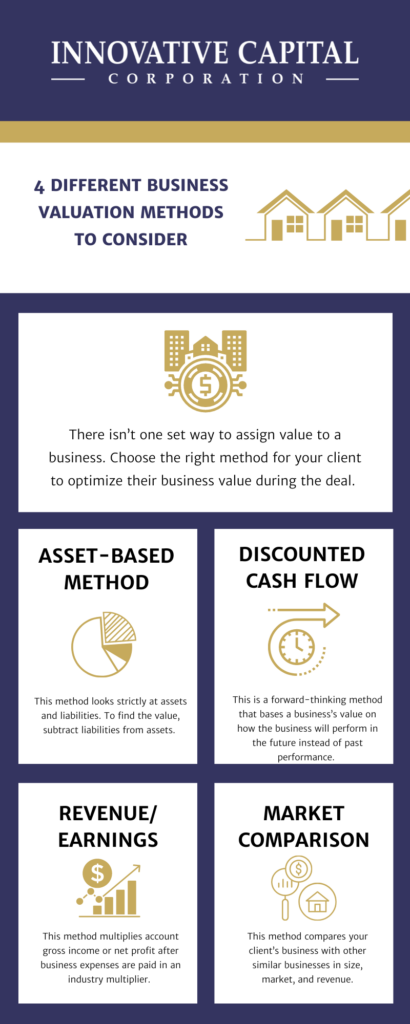Time Kills All Deals—Don’t Let Time Kill your Clients’ Deals
Correct business valuation is essential not only to receive the best price for a business in a merger and acquisition (M&A) transaction but also to form effective buy & sell agreements. Evaluating the value of a business in a timely manner can be necessary for a few reasons:
- A buyer could be interested in purchasing your client’s business
- Your client could be interested in selling their business
- Your client is establishing value for insurance
Certified Public Accountants (CPAs) looking to help clients meet their financial goals understand the importance of executing timely transactions to avoid the loss of a deal and an opportunity.
Letting too much time pass during an M&A due to either bottleneck in obtaining the right business valuation, or obtaining the right capital to finance the venture, can end a sale before it happens. Don’t hinder your chances before you start.
How InnCap streamlines the process when time is of the essence
When it comes to M&As, time is of the essence. Once the valuation comes in, it’s time to look at your funding options. By this point, both parties are eager to proceed, so finding the right loan in a timely manner is of the utmost importance.
Based on the valuation, businesses qualify for different rates on the loan needed to fund the M&A. At Innovative Capital Corporation, we have a variety of lending partners in both the traditional and alternative lending space that are fully equipped to fund a successful M&A. We source your loan to our vast network, and leverage offers to ensure your clients receive the best rate and term loan.
We, just like you, are committed to helping our clients achieve their financial goals in a quick and well-thought-out manner. Our team of commercial loan officers has the tools to fund your deals in as little as seven days.
As your clients look to undergo a merger or acquisition, it’s important that they understand the elements that come into play when valuing their business, or the business they’re trying to invest in.
How to choose the right valuation method
Understanding how much a business is worth depends on four factors:
- Demand: Businesses in high market demand will see an increase in valuation. On the other hand, lower business demand could potentially decrease the value of a business.
- Utility: Another area that contributes to the value of your business is if it serves as both a short-term and long-term solution to the buyer’s needs.
- Scarcity: Businesses that find themselves with little market competition are valuable assets because it’s harder to find or acquire a different company that offers similar services or products.
- Transferability: A business that can transfer or integrate easily with another business is worth more.
Keep in mind that buyers consider the return on investment (ROI) of the business and the risk of purchasing the business as factors that influence valuation as well.
How do you calculate the ROI of your business?
ROI can be calculated with this formula:
ROI (%) = (Return/Original Investment) x 100%
High-risk businesses typically require a higher ROI percent.
Consider value vs. price
The value of the business and the price of the business are two different things. The value can be higher or lower than the actual purchase depending on what the business offers.
A brand new commercial real estate building may have a high purchase price of$5 million dollars, but infrastructure problems can decrease the actual value of the property. On the other hand, an older commercial real estate property in an ideal location without infrastructure issues may be set at a purchase price of 4 million dollars but has more value than the new building.
4 Different Business Valuation Methods to Consider
There isn’t one set way to assign value to a business. Choose the right method for your client to optimize their business value during the deal.
- Book Value (Asset-Based Method) – this method looks strictly at assets and liabilities. To find the value, subtract liabilities from assets. This formula doesn’t take into account other business factors such as customer satisfaction and loyalty that don’t have a set monetary value. It’s important to note that, sometimes this method gives businesses higher valuations than other methods.
- Discounted Cash Flow – This is a forward-thinking method that bases a business’s value on future performance, as opposed to past performance. This method is favorable for businesses with predictable and consistent cash flow that have lower risk associated with their business. However, these futuristic projections could overestimate or underestimate the actual value of the business.
- Revenue/Earnings – This method multiplies account gross income or net profit after business expenses are paid in an industry multiplier. It is one of the most straightforward and simple methods to evaluate a business, but it lacks precision due to potential fluctuations in the market.
- Market Comparison – This method compares your client’s business with other similar businesses in size, market, and revenue. It’s another great way to find an estimated value if the information is available. However, it may not be as precise because it doesn’t take into account the assets or reputation of your client’s business.
How to increase your company’s valuation
A business should receive a valuation that reflects its true worth. Maximize the business’ valuation by highlighting these factors:
- Growth and expansion potential
- Predictable key drivers of sales
- Productive, motivated, and loyal workforce
- Strong relationships with suppliers
- Well documented systems and processes that make business operations efficient
- Well-established branding
- No past or present lawsuits
- No tax complications
- A high volume of repeat sales and customers
- Solid and positive company culture
- Easy integration and transition
Is your business or your client’s business ready for growth and expansion? Read our article about how to know if your company is positioned for big growth to learn more.



